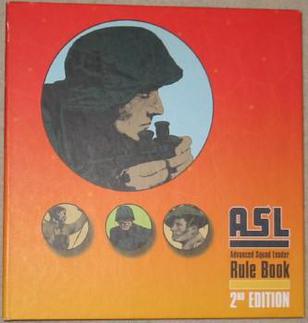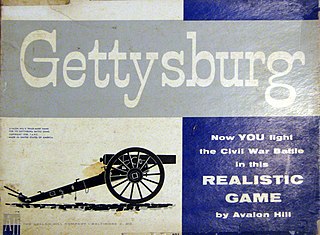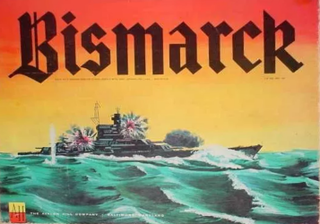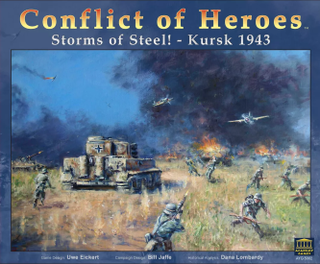Related Research Articles

Advanced Squad Leader (ASL) is a tactical-level board wargame, originally marketed by Avalon Hill Games, that simulates actions of squad sized units in World War II. It is a detailed game system for two or more players. Components include the ASL Rulebook and various games called modules. ASL modules provide the standard equipment for playing ASL, including geomorphic mapboards and counters. The mapboards are divided into hexagons to regulate fire and movement, and depict generic terrain that can represent different historical locations. The counters are cardboard pieces that depict squads of soldiers, crews, individual leaders, support weapons, heavy weapons, and vehicles.

Memoir '44 is a light wargame or war-themed strategy board game for two players. It was created by Richard Borg and published in 2004 by Days of Wonder. Illustration done by Julien Delval and Cyrille Daujean. The game can be played with up to six players if played in teams and up to eight players in the "Overlord" scenarios. However, "Overlord" requires two copies of the game. It received the 2004 International Gamers Award for General Strategy, 2-Player category and The Wargamer 2004 Award for Excellence. The game is published in English and French by Days of Wonder.

PanzerBlitz is a tactical-scale board wargame published by Avalon Hill in 1970 that simulates armored combat set on the Eastern Front of World War II. The game, which was the most popular board wargame of the 1970s, is notable for being the first true board-based tactical-level, commercially available conflict simulation wargame. It also pioneered several concepts that would become industry standards.

1914 is a board wargame published by Avalon Hill in 1968 that simulates the first few months of World War I on the Western Front.

The Russian Campaign is a strategic board wargame published by Jedko Games in 1974 that simulates combat on the Eastern Front during World War II. Avalon Hill later bought the game and produced several editions.

Napoleon, subtitled "The Waterloo Campaign, 1815", is a strategic-level block wargame published by Gamma Two Games in 1974 that simulates the Battle of Waterloo. A number of versions of the game have been produced by Avalon Hill and Columbia Games.

1776, subtitled "The Game of the American Revolutionary War", is a board wargame published by Avalon Hill in 1974 that simulates the American Revolutionary War. Its release was timed to coincide with the bicentenary of the Revolution, and for several years was a bestseller for Avalon Hill.

Battle of the Bulge is a board wargame published by Avalon Hill (AH) in 1965 that simulates the World War II battle of the same name. General Anthony McAuliffe (ret.), who had been commanding officer at Bastogne during the Battle of the Bulge, was a consultant during the game's development. The game proved popular and sold more than 120,000 copies, but was dogged by criticisms of historical inaccuracies, and was finally replaced by a completely new edition in 1981. A third edition in 1991 was released as part of the Smithsonian American History Series.

Gettysburg is a board wargame produced by Avalon Hill in 1958 that re-enacts the American Civil War battle of Gettysburg. The game rules were groundbreaking in several respects, and the game, revised several times, was a bestseller for Avalon Hill for several decades.
BattleLore is a strategy board wargame for two players, created by Richard Borg and initially published by Days of Wonder in 2006. The game is based on the same mechanics as Battle Cry, Memoir '44 and Commands & Colors: Ancients, but has a fantasy and medieval theme.

Britannia is a strategy board game, first released and published in 1986 by Gibsons Games in the United Kingdom, and The Avalon Hill Game Company in 1987 in the United States, and most recently updated in late 2008 as a re-release of the 2005 edition, produced by Fantasy Flight Games. It broadly depicts the wars in, and migrations to, the island of Great Britain in the centuries from the Roman invasions to the Norman Conquest.

Stalingrad is a strategic-level board wargame published by Avalon Hill in 1963 that simulates the first 24 months of the war between Germany and the Soviet Union during World War II. As one of the first board wargames it was extensively played and discussed during the early years of the wargaming hobby.

Tobruk, subtitled "Tank Battles in North Africa 1942", is a board wargame published by Avalon Hill in 1975 that simulates tank combat in North Africa during World War II.

Bismarck is a board wargame published by Avalon Hill in 1962 that simulates the hunt for the Bismarck.

A board wargame is a wargame with a set playing surface or board, as opposed to being played on a computer or in a more free-form playing area as in miniatures games. The modern, commercial wargaming hobby developed in 1954 following the publication and commercial success of Tactics. The board wargaming hobby continues to enjoy a sizeable following, with a number of game publishers and gaming conventions dedicated to the hobby both in the English-speaking world and further afield.

War and Peace, subtitled Game of the Napoleonic Wars: 1805–1815, is a board wargame published by Avalon Hill in 1980 that simulates ten years of Napoleonic wars.

Conflict of Heroes: Storms of Steel, the second installment of the Conflict of Heroes board wargame series by Academy Games, was published in 2009. The game simulates the Battle of Kursk on the Eastern Front during World War II.

Dreadnought, subtitled "Surface Combat in the Battleship Era, 1906-45", is a naval board wargame published Simulations Publications, Inc. (SPI) in 1975.

Air Force is a board wargame published by Battleline Publications in 1976, and subsequently re-released by Avalon Hill in 1977, that simulates air combat during World War II. Several expansions for the game were also published.

Heroscape is an expandable turn-based miniature wargaming system originally manufactured by Hasbro subsidiaries from 2004 until its discontinuation in November 2010. Geared towards younger players, the game is played using pre-painted miniature figures on a board made from interlocking hexagonal tiles, allowing for the construction of an interchangeable and variable 3D landscape. This system and the relatively high production quality of the game materials have been lauded by fans even years after the game was discontinued.
References
- ↑ Hickman, Tracy (2007). "Battle Cry". In Lowder, James (ed.). Hobby Games: The 100 Best . Green Ronin Publishing. pp. 21–23. ISBN 978-1-932442-96-0.
- 1 2 3 4 Connors, J.C. (2000-06-30). "Pyramid Pick: Battle Cry". Pyramid (Online). Steve Jackson Games . Retrieved 2008-02-18.
- ↑ "2001 International Gamers Awards Finalists and Recipients". Archived from the original on 2007-09-13. Retrieved 2008-02-18.